“I have no problem answering that, signora. We’re looking for a woman.”
“A woman? What woman?” Signora Sinagra asked in shock.
“A transsexual named Giovanna Lonero, with whom your husband Franco has been in a relationship for some time, and who—”
“Ahhhhhhh!”
It was a sort of roar so loud and unexpected that Montalbano leapt to his feet. He could hear over his head the footsteps of the three men upstairs scrambling down the stairs to see what was happening.
“They tried to tell me! Ahhhhhh! They tried to tell me! Ahhhhh! An’ I’s too stupid to listen! Ahhhhh!”
“Calm down, signora, stop that!”
“That goddamn son of a stinking whore! Jesus, how disgusting! Yechhh! Ahhhhhh! With someone you don’ even know if iss a man or a woman! I’m gonna kill the stinkin’ bastard wit’ my own hands!”
They were unable to hold her back, and she dashed into the kitchen and moved an enormous refrigerator on wheels out of position. Montalbano immediately understood.
“Lamarca, take her into another room.”
Despite the fact that the young officer was strong and burly, he had a rather hard time dragging away the woman, who had stopped roaring and was now crying.
The inspector bent down to examine the floor carefully and noticed a few tiles that formed a sort of single block.
“This is a trapdoor. Galluzzo and Di Grado, try and see if you can open it.”
After fifteen minutes of trying, they still hadn’t succeeded. Montalbano then noticed a small button next to the electrical socket of the refrigerator. He pressed it with one finger, and the trapdoor opened without a sound. The classic Mafia rabbit hole with no escape. As Galluzzo and Di Grado pointed their machine guns, the inspector bent down towards the entrance and, cupping his hands around his mouth to amplify the sound, said:
“Come out immediately, or I’m going to throw a hand grenade down there!”
Galluzzo and Di Grado looked at him, mystified. Hand grenade? Where? At that moment the raised hands and then the scarred face of Vittorio Carmona, killer and bodyguard, appeared.
“’Cuff him! He’s wanted for murder!” the inspector ordered.
Then Franco Sinagra popped out. He was in his underpants and carrying his clothes.
“You’re under arrest for ordering the murders of Filippo Manzella and Matilde Verruso, and for the attempted murder of Inspector Fazio.”
“Can I get dressed?”
“No.”

It was a day of bedlam. News reporters, TV cameras, telephone interviews, the commissioner pissed off because that asshole Arquà had turned over to him a hot letter that he should actually have given to Montalbano, and in so doing, got him into trouble, Tommaseo completely in the dark as to everything and going around saying it was thanks to him that Sinagra was seen on all the national television news programs in his underpants . . .

Around nine o’clock that evening, as the inspector was driving home to Marinella, the cell phone rang. It was Angela.
“Just a minute,” he said.
He pulled over to the side of the road before speaking again.
“Angela, thank you so much for everything. You were brilliant! You performed marvelously with Prosecutor Tommaseo! If not for you . . . How did you find out, anyway?”
“What do you mean, how did I find out? The TV news programs haven’t been talking about anything else! Why didn’t you call me?”
He’d quite simply forgotten.
“I’m sorry, Angela, but with all that was happening . . .”
“I understand.”
“Now you have nothing more to be afraid of. No one can blackmail and force you to do anything you don’t want to do.”
“You know, Salvo, I was thinking . . .”
“Tell me.”
“Don’t take it the wrong way. But, well, since there’s no longer any reason for us to see each other . . .”
A punch in the stomach. But of course she was right. What reason was there for them to see each other?
“. . . you won’t be coming to my place tonight.”
“Don’t be offended, Salvo. Try and understand me.”
“I’m not offended, I understand you perfectly.”
“I’m sorry, okay? And give me a ring whenever you like. Ciao.”
“Ciao.”
Sitting out on the veranda, with a touch of melancholy to keep him company, he tried to console himself with a dish—a huge one—of caponata.
Click here for more books by this author
Author’s Note
Like The Wings of the Sphinx , this novel had its origin in a press clipping sent to me by my providential friend Maurizio Assalto, whom I thank warmly. And apparently it’s not entirely superfluous to declare that all the characters, situations, episodes, and places in this story belong to my imagination and not to the real world. But when one writes, even pure fiction, isn’t one’s reference always the real world?
Notes
Zingarelli’s a dictionary:Zingarelli’s is one of the standard dictionaries of modern Italian.
municipal police officer:What Italians call a vigile urbano is part of a different department of law enforcement from the commissariato , of which Montalbano is chief, and which handles criminal cases.
“madhouse!” “But weren’t they abolished?”:In 1978, the passage of Law 180 (also known as the Franco Basaglia Law, after the famous psychiatrist-neurologist who inspired it) technically abolished insane asylums in Italy. Among other things, it eliminated “dangerousness” as an acceptable reason for internment. It did stipulate, however, that “obligatory mental health treatment” ( Trattamento Sanitario Obbligatorio , or TSO) must be applied to individuals whose “psychological disturbances are such as to require urgent therapy,” if such therapy is not voluntarily accepted by the persons in question. Care to the mentally ill would be provided by a variety of institutions, including outpatient clinics, community centers, and “residential” and “semiresidential” centers.
Law 180 was slow in being applied. The first Berlusconi government moved in 1994 to close the remaining sanatoriums still open. But, as it turns out, the current system makes available to patients far more psychiatric services than before; the “residential centers” are, in effect, psychiatric hospitals. The inflexibly coercive nature of the pre-1978 asylums has, however, been considerably diminished.
Ragionier Muscetta: Ragioniere is a largely meaningless title given to accountants whose specialization does not go beyond that provided by vocational school. A full certified accountant is called a contabile .
“like one of those carabinieri jokes”:The carabinieri are often the butt of jokes in Italy, always having to do with their lack of intelligence.
Monsieur Lapalisse:A reference to the legendary Jacques de la Palisse (1470–1525), a French nobleman and military officer active in Francis I’s Italian campaign, during which he was killed. His epitaph reads: Ci gît Monsieur de La Palice: S’il n’était pas mort, il ferait encore envie (“Here lies Monsieur de la Palisse: Were he not dead, he would still be envied”). This was originally misread—by mistake, presumably—as saying “. . . S’il n’était pas mort, il serait encore en vie ” (“Were he not dead, he would still be alive”), due perhaps to the potential confusion between f and s in serif script. The misreading gave rise to a whole tradition of burlesque song variants, with similar tautological plays on words, such as Il n’eût pas eu son pareil / S’il avait été seul au monde (“He would have had no equals / Had he been alone in the world”). The many variants were brought together into La chanson de La Palisse by Bernard de la Monnoye in the early eighteenth century, though other versions exist as well.
Читать дальше













